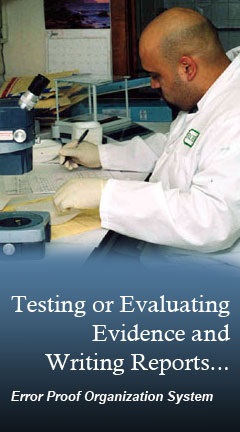Archival Notice
This is an archive page that is no longer being updated. It may contain outdated information and links may no longer function as originally intended.
Home | Glossary | Resources | Help | Course Map
Experts may receive information or evidence related to a case. They may be asked to evaluate or test evidence items and produce analytical reports summarizing their findings. In producing their report, they record all tests and evaluation steps.
In addition to the report, they may generate other information, such as supplementary supporting documentation, including chain-of-custody forms, handwritten notes, summaries of phone conversations with the client or other relevant parties, photographs, sketches, spreadsheets, worksheets and raw data. Experts should preserve all data for discovery and trial.
Throughout all stages of the case, experts should keep a running list of additional information required for follow-up investigation. They can use the list as a guide for preparing tracking devices for case information, either manually or as part of a computer program. A single case may require a number of different investigative methods and follow-up, and experts may handle multiple cases at the same time. Experts must have an error-proof organizational system.
Additional Online Courses
- What Every First Responding Officer Should Know About DNA Evidence
- Collecting DNA Evidence at Property Crime Scenes
- DNA – A Prosecutor’s Practice Notebook
- Crime Scene and DNA Basics
- Laboratory Safety Programs
- DNA Amplification
- Population Genetics and Statistics
- Non-STR DNA Markers: SNPs, Y-STRs, LCN and mtDNA
- Firearms Examiner Training
- Forensic DNA Education for Law Enforcement Decisionmakers
- What Every Investigator and Evidence Technician Should Know About DNA Evidence
- Principles of Forensic DNA for Officers of the Court
- Law 101: Legal Guide for the Forensic Expert
- Laboratory Orientation and Testing of Body Fluids and Tissues
- DNA Extraction and Quantitation
- STR Data Analysis and Interpretation
- Communication Skills, Report Writing, and Courtroom Testimony
- Español for Law Enforcement
- Amplified DNA Product Separation for Forensic Analysts


